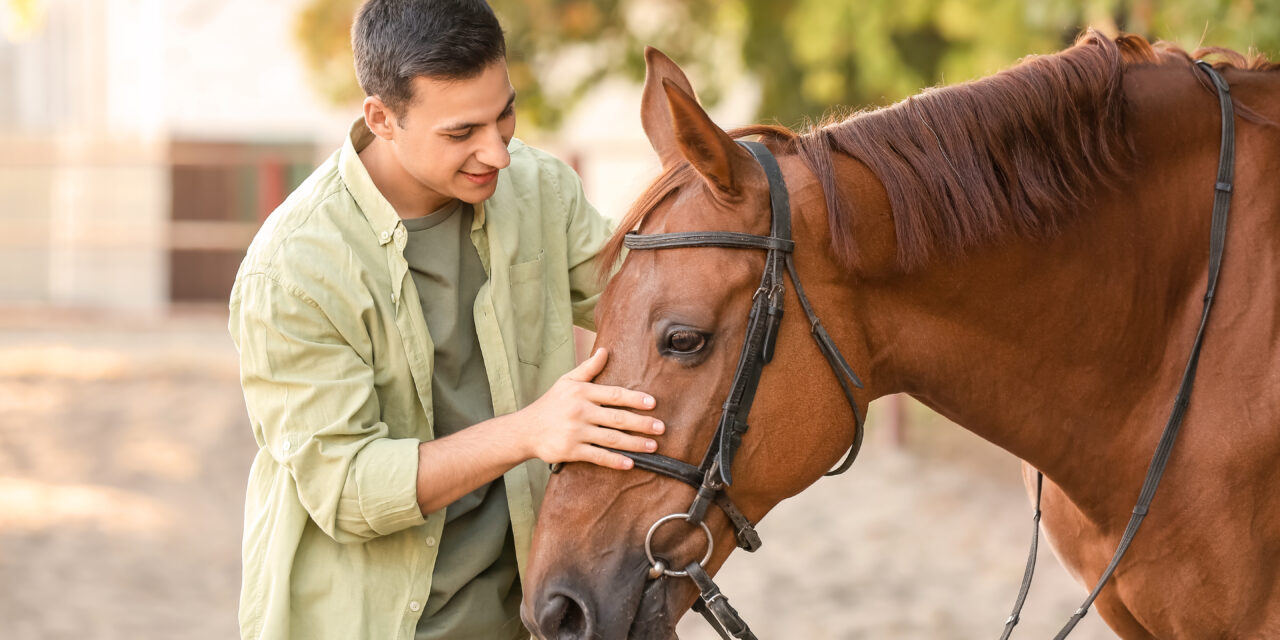Have you ever caught an old episode of Mr. Ed on television? The sitcom starred a “talking” horse who frequently gave advice to his owner, an architect named Wilbur. Hijinx generally ensued.
When you hear the term “equine therapy,” you might think the process involves getting advice from horses—and that might strike you as ridiculous.
Well, yes and no.
Equine therapy is actually an effective way to address a number of issues individuals face—including the unique stress and trauma-centered disorders that are common among veterans of the military and first responders.
Let’s take a closer look at equine therapy.
Three Important Characteristics of Horses
Horses (under the supervision of physical and mental health professionals) are effective therapy animals for three key reasons:
- Horses are extremely intelligent and intuitive. Horses—perhaps as a result of evolving in ways that help protect them from predators—are quite smart and exceptionally good at understanding and reacting to nonverbal cues and a person’s body language. As an individual sees how a horse reacts to them, they can gain understanding about themselves.
- Horses are sizable and powerful animals. The sheer size and power of a horse is a useful metaphor for dealing with big challenges in a person’s life. Thinking through how best to interact with a horse in a given moment serves as a stand-in for thinking about how best to solve a problem or address a challenge.
- Horses have their own individual personalities. Spending time with horses reveals that no two are exactly alike in terms of personality traits—which is, of course, true of humans, too. Witnessing the personalities, moods, and attitudes of horses as they interact can help a person think through the ways they interact with other people in their lives.
How Horses Help Vets and First Responders
Many military veterans and first responders find themselves dealing with post-traumatic stress disorder (PTSD), which can cause a person to have a recurring sense of reliving traumatic events.
PTSD often leads to an ongoing sense of hypervigilance—which often feels like a continuous charge of nervous energy that never abates because the person in question is always on alert for danger that they fear may arise at any moment without warning. Due to their sensitivity to human emotion, a horse participating in an equine-assisted therapy session will be aware of these feelings and may help mitigate them.
Horses can also help mitigate feelings of depression and numbness that often upend a person’s relationships with other people in their lives. A horse offers no judgment or unwanted advice or condescension. Instead, a horse in a therapeutic setting simply accepts the energy that comes from the client and often reflects it back.
In order to interact with the horse in a positive way, a Veteran or first responder must learn to relax and put some trust in the animal. As this attitude of calmness and trust develops, an individual can build a connection with the horse. That process is good practice for building (or rebuilding) relationships with others in a positive, mutually beneficial way.
Equine therapy is always personalized to an individual’s specific needs, and so the details of the therapy may vary from person to person. The most important thing to keep in mind is that this form of therapy has an established track record of leading to positive outcomes for those who have served our country and community in stressful and traumatic circumstances.
Equine Therapy is Just One of the Ways We Can Help Vets and First Responders
Equine therapy is part of The Aviary Recovery Center’s larger program for helping Veterans and first responders. Our Tactical Recovery program is specifically designed to serve those whose own service may have led to the development of a mental health disorder, a substance use disorder, or both.
The Tactical Recovery approach is built around a focus on the mind, body, and spirit of each individual who participates in the program. A spirit of compassion and a commitment to quality care in an atmosphere that encourages and facilities growth underpin the program.
Hop on Your Horse and Ride on Over for the Help You Need
Okay, so maybe a horse is not the most common way folks get to The Aviary Recovery Center—located near St. Louis, Missouri—for treatment for substance use disorders and co-occurring mental health disorders. But no matter how you get here, when you arrive you will find a staff committed to personalized care grounded in evidence, expertise, experience, and empathy. We can help you get sober, improve your mental health, and maintain those improvements to your overall quality of life over time. Listen, at The Aviary Recovery Center, we are not horsing around. We are ready and able to help you.










